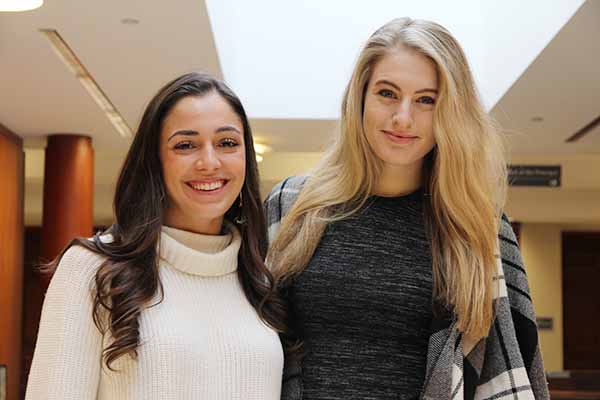New program aims to ‘Flip the Script’ on sexual assault
November 17, 2017
Share

A new program aimed at providing first-year, female-identified students with the tools to prevent and resist sexual assault is being introduced to the Queen’s community this fall.
An initiative of the Human Rights Office, the Enhanced Assess, Acknowledge, Act (EAAA) sexual assault resistance education program is an evidence-based program developed by University of Windsor professor and researcher, Charlene Senn. Known on campus as “Flip the Script,” the program has a focus on addressing acquaintance sexual assault.
Dr. Senn, who leads the Sexual Assault Resistance Education (SARE) Centre, has researched, developed, and tested the program over a 10-year period and now EAAA is being shared with universities across Canada and around the world.
At Queen’s, the EAAA program is being led by Sexual Violence Prevention and Response Coordinator, Barb Lotan and Human Rights Advisor, Margot Coulter. The pair traveled to Windsor earlier this year to attend a train-the-trainer session and become thoroughly familiar with the project. Work over the summer included hiring and training three peer facilitators who are responsible for delivering the modules to the students. In addition to Ms. Coulter and Ms. Lotan, the five-person team now also includes graduate students Catrina Mavrigianakis, Natalie Brown and Luissa Vahedi.
The program is 12 hours in length with sessions being delivered over four evening or two full-day sessions on a weekend. This fall, weekend sessions are being offered on Nov. 18-19 or Nov. 25-26.
The two-day sessions are divided into four main sections: providing information, skills, and practice in assessing risk; overcoming emotional barriers in acknowledging danger; engaging in effective verbal and physical self-defence; and exploring one’s own sexual values, boundaries, and rights. Using conversation, interactive activities and videos, young women can explore the topics in a safe and comfortable environment.
The Flip the Script program is part of a comprehensive approach to preventing sexual violence at Queen’s. A variety of other programs running on campus, including Bystander Intervention Training and RAD, are complementary to this program.
Statistics show that as many as one in four female university students will experience either an attempted or completed sexual assault before they graduate. The aftereffects can be devastating and providing support to the survivor is vital.
All of those involved in delivering Flip the Script are committed to making a difference and creating opportunities for young women to change the conversation about sexual violence.
“People who are sexually assaulted often suffer adverse consequences in terms of mental health and can have a really difficult time focusing on school. It can really take a toll on your academics,” Ms. Brown says, adding that the majority of sexual assaults involve a male acquaintance, an important focus of the EAAA program. “We want women to be as successful as possible in all of their endeavors, so our goal is to reduce obstacles that prevent that from happening. This program is one vehicle for doing that.”
Statistics also show that a female student is most likely to experience an attempted or completed sexual assault during their first year at university – a time of transition, new situations and new acquaintances.
By providing information on danger cues, assessing risk in various situations, and how to react or respond, the program aims to help female students navigate the dangers they may face. As the old saying goes, knowledge is power.
“We really hope that we can make their transition to university life a little easier, make them feel a little more comfortable in their own skin or give them the tools to navigate the complex situations that do arise in social and sexual settings, and give them the sense that they can trust themselves,” says Ms. Mavrigianakis. “And it is also about what danger cues look like in men, what dangerous situations look like and feel like and giving women the space and the confidence to trust their intuition.”
Implementation of EAAA/Flip the Script on Queen’s campus is part of ongoing research being done by Dr. Senn and her team at the SARE Centre.
Space is still available in the upcoming November session. More sessions are scheduled for March 2018. There is no fee to participate. Participation is limited to first-year, female-identified students enrolled at Queen’s. Contact the team at eaaaproject@queensu.ca for more information and to register, while a Facebook page is available as well.